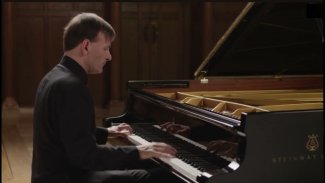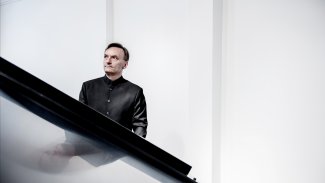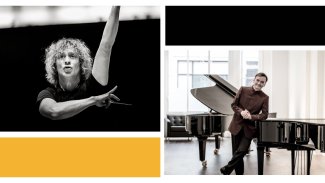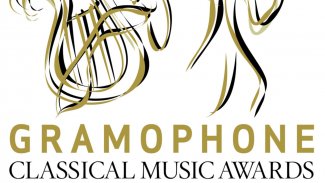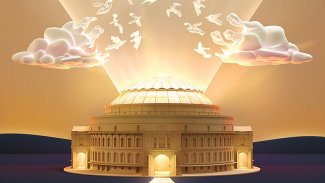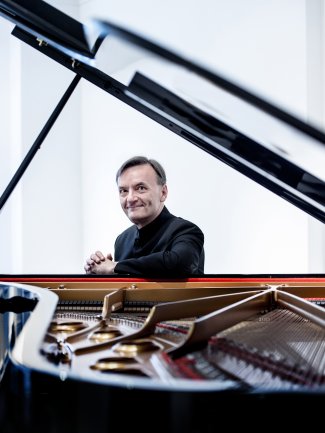


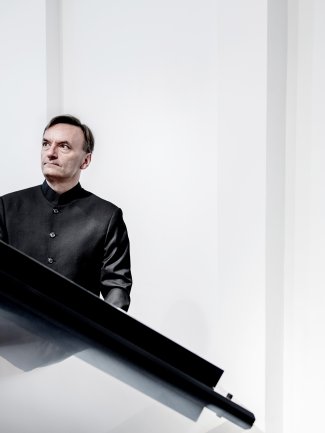
Sir Stephen Hough
“Few living pianists manage to combine open-hearted virtuosity with so tangible and unaffected a sense of an inner world beyond the notes.”
(The Arts Desk)
Named by The Economist as one of Twenty Living Polymaths, Sir Stephen Hough combines a distinguished career of a concert pianist with those of a composer and writer. In recognition of his contribution to cultural life, he became the first classical performer to be given a MacArthur Fellowship, and was awarded a Knighthood for Services to Music in the Queen’s Birthday Honours 2022.
In a career spanning over 40 years, Stephen Hough has played regularly with most of the world’s leading orchestras, including televised and filmed appearances with the Berlin, London, China, Seoul and New York Philharmonic Orchestras, and the Concertgebouw, Budapest Festival and the NHK Symphony Orchestras. He has been a regular guest of recital series and festivals including Carnegie Hall’s Stern Auditorium, London’s Royal Festival Hall, Salzburg, Verbier, La Roque‑d’Anthéron, Aspen, Tanglewood, Aldeburgh and Edinburgh.
He begins his 2024/25 concert season with his 30th appearance at the BBC Proms, performing at Last Night of the Proms to a live audience of 6,000 and televised audience of 3.5 million. Over the course of the following 12 months Hough performs over 80 concerts on four continents, opening Philharmonia Orchestra’s season at the Royal Festival Hall, performances with the Cleveland Orchestra, performing a solo recital at Barbican Centre and giving the world premiere of his Willa Cather-inspired Piano Quintet at Lincoln Center’s David Geffen Hall. Following the 2024 world premiere of his own Piano Concerto (The World of Yesterday), named after Stefan Zweig’s memoir, Hough brings the work to Adelaide, Bournemouth, Oregon, Singapore and Vermont Symphony Orchestras.
See more
Hough’s discography of 70 recordings has garnered awards including the Diapason d’Or de l’Année, several Grammy nominations, and eight Gramophone Awards including Record of the Year and the Gold Disc. For Hyperion he has recorded the complete piano concertos of Beethoven, Brahms, Liszt, Mendelssohn, Rachmaninov, Saint-Saëns and Tchaikovsky as well as celebrated solo recordings of the Final Piano Pieces of Brahms, Chopin’s complete nocturnes, waltzes, ballades and scherzi, as well as recitals of Schumann, Schubert, Franck, Debussy and Mompou. Upcoming releases include a Liszt Album, a recital of encores, including arrangements made for Lang Lang’s Disney project, and Hough’s own Piano Concerto.
As a composer, Hough’s Fanfare Toccata was commissioned for the 2022 Van Cliburn International Piano Competition and performed by all 30 competitors. His 2021 String Quartet No.1 Les Six Rencontres, was written for and recorded by the Takács Quartet for Hyperion Records. Hough’s body of songs, choral and instrumental works have been commissioned by Musée du Louvre, National Gallery of London, Westminster Abbey, Westminster Cathedral, the Wigmore Hall, the Genesis Foundation, Gilmore International Keyboard Festival, the Walter W. Naumburg Foundation, BBC Sounds, and the Berlin Philharmonic Wind Quintet. His music is published by Josef Weinberger Ltd.
As an author, Hough’s memoir Enough: Scenes from Childhood, was published by Faber & Faber in Spring 2023. It follows his 2019 collection of essays Rough Ideas: Reflections on Music and More which received a Royal Philharmonic Society Award and was named one of the Financial Times’ Books of the Year. His novel The Final Retreat was published in 2018 (Sylph Editions). He has also written for The New York Times, The Telegraph, The Times, The Guardian and the Evening Standard. Hough is an Honorary Bencher of the Middle Temple, an Honorary Member of the Royal Philharmonic Society, an Honorary Fellow of Cambridge University’s Girton College, the International Chair of Piano Studies and a Companion of the Royal Northern College of Music, and is on the faculty of The Juilliard School in New York.
Contacts
Jane Brown Senior Director, Co-Head of Artist Management Anna Wetherell Associate Director, Composers & Artists
worldwide general management
Anna Wetherell Associate Director, Composers & Artists
worldwide general management
Season Highlights
ATX Music and Jazz
Show more about ATX Music and Jazz
CECILE CHAMINADE: Automne
CECILE CHAMINADE: L'Autre Fois
FRANZ LISZT: Sonata for Piano in B minor, S178
CECILE CHAMINADE: Theme Varie
CECILE CHAMINADE: Les Sylvains
FREDERIC CHOPIN: Sonata No. 3 in B minor, Op. 58
Oregon Symphony
Show more about Oregon Symphony
Vancouver Symphony Orchestra
Show more about Vancouver Symphony Orchestra
Barbican Centre
Show more about Barbican Centre
LUDWIG VAN BEETHOVEN: Concerto for Piano No. 3 in C minor, Op. 37
Show more season highlights
Suntory Hall
Show more about Suntory Hall
Sydney Opera House
Show more about Sydney Opera House
IAIN GRANDAGE: LiFT
JOHANNES BRAHMS: Concerto for Piano No. 1 in D minor, Op. 15
Adelaide Town Hall
Show more about Adelaide Town Hall
FELIX MENDELSSOHN: Concerto for Piano No. 1 in G minor, Op. 25
Melbourne Recital Centre
Show more about Melbourne Recital Centre
CECILE CHAMINADE: Automne
CECILE CHAMINADE: L'Autre Fois
CECILE CHAMINADE: Les Sylvains
FRANZ LISZT: Sonata for Piano in B minor, S178
STEPHEN HOUGH: Sonatina Nostalgica
FREDERIC CHOPIN: Sonata No. 3 in B minor, Op. 58
Queensland Performing Arts Centre
Show more about Queensland Performing Arts Centre
JOHANNES BRAHMS: Concerto for Piano No. 1 in D minor, Op. 15
Riverhouse Barn
Show more about Riverhouse Barn
FRANZ SCHUBERT: Klavierstück Es-Dur D 946/2
ARNOLD SCHOENBERG: Six Little Piano Pieces, Op.19
KARLHEINZ STOCKHAUSEN: Klavierstücke
LUDWIG VAN BEETHOVEN: Bagatelle, Op. 119, No. 10
LUDWIG VAN BEETHOVEN: Sonata for Piano No. 21 in C major, Op. 53 “Waldstein”
ROBERT SCHUMANN: Carnaval, Op. 9
SHERMAN arr. HOUGH: Mary Poppins Suite
Buxton Festival
Show more about Buxton Festival
CECILE CHAMINADE: Automne
CECILE CHAMINADE: L'Autre Fois
CECILE CHAMINADE: Les Sylvains
FRANZ LISZT: Sonata for Piano in B minor, S178
ROBERT SCHUMANN: Carnaval, Op. 9
SHERMAN arr. HOUGH: Mary Poppins Suite
Ryedale Festival
Show more about Ryedale Festival
CECILE CHAMINADE: Automne
CECILE CHAMINADE: L'Autre Fois
CECILE CHAMINADE: Les Sylvains
FRANZ LISZT: Sonata for Piano in B minor, S178
ROBERT SCHUMANN: Carnaval, Op. 9
SHERMAN arr. HOUGH: Mary Poppins Suite
Christ Church Cathedral Oxford
Show more about Christ Church Cathedral Oxford
CECILE CHAMINADE: Automne
CECILE CHAMINADE: L'Autre Fois
CECILE CHAMINADE: Les Sylvains
FRANZ LISZT: Sonata for Piano in B minor, S178
ROBERT SCHUMANN: Carnaval, Op. 9
SHERMAN arr. HOUGH: Mary Poppins Suite
Tippet Rise Art Center
Show more about Tippet Rise Art Center
FRANZ SCHUBERT: Klavierstück Es-Dur D 946/2
JOHANNES BRAHMS: Klavierstücke op. 118, VI. Intermezzo in E♭ minor
ARNOLD SCHOENBERG: Six Little Piano Pieces, Op.19
KARLHEINZ STOCKHAUSEN: Klavierstücke
LUDWIG VAN BEETHOVEN: Bagatelle, Op. 119, No. 10
ROBERT SCHUMANN: Carnaval, Op. 9
SHERMAN arr. HOUGH: Mary Poppins Suite
“A blockbuster performance from Hough is almost a given, and sure enough, his technical and expressive gifts were on full display..”
“Hough, balancing bravura with lyricism, powered his way through the outer movements with thrilling exactitude, and carefully probed the emotions beneath the Andante’s delicate surface.”
“Hough displayed a demonic level of concentration with complete economy of means. There wasn’t a single superfluous movement as he negotiated the hills and dales of Rachmaninov’s music, pulling melodies out of a wash of notes. In Hough’s playing, the timbre of each phrase was so much more than the sum of its individual notes, which made the big sweeping themes come through wonderfully.”
“Hough offers musicianship of the finest order. And after the fleeting Sonata in E minor fragment, Hough makes the Sonata in A major, D664 all beguiling simplicity. He sings in the Allegro moderato, muses in the Andante and dances in the finale. It’s a graceful delight.”
“What a joy it is to bask in Stephen Hough’s musicianship. […] The G major andante, with its strange echoes of the allegro from Beethoven’s 18th piano sonata, is pure Houghian delight: precision, phrasing, suspension, a delicacy of touch coexisting with an unfettered robustness. The carefree innocence of the A major’s opening movement is meat and drink to the pianist, and his playing of it demonstrates — again — why he is a supreme interpreter of Schubert: the nuance, shading and sonority seem both acutely focused and entirely innate.”
“Hough turned in a stylish Tchaikovsky, combining technical prowess with a sophisticated musical personality. In the first movement, he played nobly and with direction. Declarative episodes were vigorous without being forced, and nimble passagework was dispatched with a feathery touch. […] Hough brought great emotional warmth to the slow movement, and again displayed considerable freedom in his shaping of rhapsodic lines. The finale surged forth with fiery spirit.”
“Beethoven’s Third Piano Concerto […] brought out a bristling, vehement side to the soloist Stephen Hough that was compelling from the start. Underscoring the instability of the music, he pounced on phrases, finding sharp accents and, in the first movement cadenza, impetuous virtuosity. All this suddenly seemed like a distant memory in his noble, affecting adagio — the back and forth with the winds was hypnotic — until he snapped back into a climactic rondo delivered with serious bite.”
“Both its deeply considered, distinctive rethinking of canonic repertory and the sheer poetry of its execution make this a release that neither students of Chopin nor lovers of fine piano-playing will want to miss.”
“If there’s a right time in life to record certain works, then Stephen Hough has chosen precisely the right time to record these masterpieces [by Schumann]. They’re familiar works but in Hough’s hands we hear them afresh. Mature, worldly, insightful, probing – his playing is all these and more.”
“There had definitely been no lack of glitter or fizz in the account of Saint-Saëns’s Fourth Piano Concerto that had opened the concert. Stephen Hough was the soloist, dazzling in the precision of his bravura flourishes and assertively muscular in the statements of the theme on which the first movement is built, as the concerto’s mood switches from the portentous to the frivolous and back again.”
“The awe-inspiring range and command of Stephen Hough’s pianism may be a given, but here [in his latest album Vida Breve] he has rarely sounded more imperious […] A hair-raising blend of mastery and imagination characterises the finale’s whirling diablerie [in Chopin’s Funeral March Sonata]. Two encores offer unforgettable solace […] showcasing his liquid honey touch and caressing instinct for nuance and inflection. […] A superb release.”
“A superlative hour of virtuoso music-making from Britain’s top pianist […] Hough is a profound thinker as well as a mercurial performer […] Even in the most grandiose passages of [the Bach-Busoni Chaconne] he found a dark nobility, rising to anger at the mid-point climax, but then conjuring a mood of sublime consolation at that magic moment when Bach turns the tonality from minor to major. His interpretation [of the Schumann Fantasie] was breathtaking in its bravery, the perfect example of why live performance if the lifeblood of music.”
“Wonderful, almost miraculous […] There isn’t a colour, weight of attack or nuance of phrasing or rhythm that passes him by. Yet every effect, from the decorative flights in the early concertos to the imperial fortissimos of No.5, arrives and departs with natural ease. The most thrilling and moving performance? I’d nominate the kaleidoscopic No.3, blessed here with a particularly fiery Beethoven cadenza and a central largo so tenderly, thoughtfully stroked and probed that my tear ducts opened.”
“This is a deeply rewarding and distinguished set of the Beethoven piano concertos. Stephen Hough, Hannu Lintu and the excellent FRSO are perceptive and stylish interpreters of the music.”
“Blend imaginative yet learned interpretation, profound sensitivity and poetry, and personal charisma, and you have here one of the finest accounts of Brahms’s late piano works on record, one that stands head and shoulders above most contenders.”
“The [CD] by Hough of the [Rachmaninov Paganini] Rhapsody is exceptional, as he balances bravura with passions, poetry and a hint of whimsy.”
“The performance of Beethoven Piano Concerto No.3 showed soloist in superb, even remarkable form […] Every note and line he played gave the impression of purpose, that Hough had found musical insight and personal meaning in every moment of the score. His approach was not just intellectual but emotional, with uncommon freshness and fire.”
“Witty, wistful, extrovert, introspective and cheeky by turn, this is a masterclass in a certain style of piano-playing, and a dream of an album.”
“Each half [of Hough’s Royal Festival Hall recital] brought one of the two sets of Debussy’s Images. What dazzled me the most was this selfless and unshowy pianist’s effortless handling of the aqueous arpeggios in ‘Reflets dans l’eau’, bright and delicate, rippling from his graceful right hand. There were many more chances to savour his featherweight brilliance and acute feeling for Debussy’s explorations of sound, from the meditative moon piece in the second book of Préludes, beautifully handled, to the piscine ballet of ‘Poissons d’or’.”
“Thunder and lightning – this time from the keyboard – featured earlier in the week (Prom 20), when Stephen Hough gave a powerful and magisterial account of Brahms’s first piano concerto […] Hough took charge and drove the enormous first movement with impressive authority, cementing his position in the front rank of Britain’s pianists today.”
“Hough’s impeccable ear for the inner voice, his way with line, the sheer musicality of his approach came through with crystal clarity. He’s truly an exquisite player.”
“The man is an intellectual and physical pianistic powerhouse. He raises more issues and questions per piece than almost any pianist I know. He flings out challenges to preconceptions. And he educates with every phrase […] It was all of these things and more in Hough’s mesmerising probe into the heart and soul of [Schubert’s Sonata in A minor]. What we were hearing, in effect, was a masterclass in musical analysis and perception.”
“It’s hard not to be a little awestruck by the breadth of Stephen Hough’s passions, to say nothing of his talents. [He] is simply one of the most interesting musicians around.”
“Whatever Stephen Hough plays, he either distils its essence or finds something strikingly new to say about it, and so it was with his Debussy and Chopin programme. He delivered La plus que lente with a languid silkiness, hands seeming to sink onto the keys rather than striking them, and with Estampes created exquisite impressionism. To Chopin’s Ballades he brought his particular perfectionism, which resides in the scrupulous shaping of every phrase and weighing of every note.”
“Schumann’s Piano Concerto, with Stephen Hough as soloist, had been a performance of such startling freshness and clarity that one of the most familiar of all 19th-century piano concertos seemed totally reimagined, with the sweep and vigour supplied by Andris Nelsons and the City of Birmingham Symphony Orchestra as the perfect foil to Hough’s cool brilliance.”

